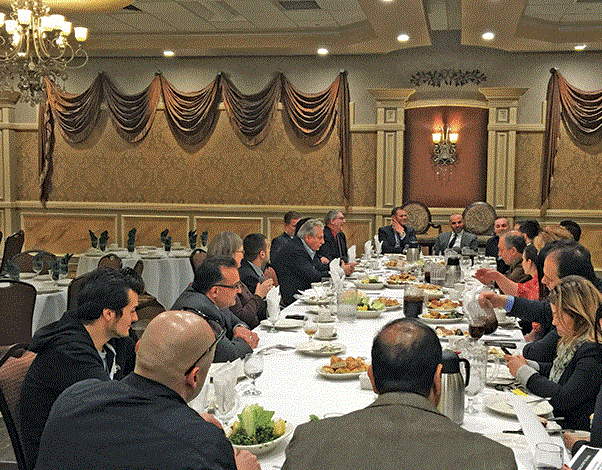
DEARBORN — The Arab American Political Action Committee (AAPAC) has endorsed proposal 1 after debating the pros and cons of the measure at a public forum at Byblos Banquet Hall on Wednesday, April 8.
Carmine Palombo, deputy executive director of Southeast Michigan Council of Governments; Brad Williams, vice president of government relations for the Detroit Regional Chamber, who spoke on behalf of Governor Snyder, and David Mustonen, communications coordinator at the Dearborn Public Schools, all highlighted the pros of approving the proposal.
AAPAC invited representatives of the opposing side of the measure, but they did not attend the meeting. However, many AAPAC members did address several issues of concern, such as the possibility of increasing both the sales tax and the wholesale tax on fuel.
Proposal 1, which will appear on the May 5 ballot, seeks to amend the state constitution by increasing the sales tax from 6 percent to 7 percent, while exempting fuel purchases, in an effort to repair the state’s deteriorating roads, highways and bridges.
Palombo explained that motorists are currently paying 19 cents per gallon in fuel tax, as well as an additional sales tax on the gasoline they put in their cars.
“You are really paying about 38 cents right now when you go pump a gallon of gas,” he said. “The problem is the sales tax on the gasoline does not go to improve roads. Only the 19 cents gas tax does.”
If Proposal 1 is approved, it would create a higher wholesale tax on fuel, at 41.7 cents per gallon.
Palombo noted that amending the Michigan constitution, as called for by Proposal 1, would allow legislators to allocate $1.2 billion annually on road construction.
“The legislature hasn’t provided any money since 1997,” he said. “If this proposal passes, this will be the first time since 1997 that we’ve gotten any money at all to improve our systems.
Williams spent much of his presentation discussing the poor conditions of Michigan’s roads and how current fuel tax laws have had a direct impact.
“When you cross into the Ohio border you don’t need to see the ‘welcome to Ohio’ sign, you can feel it in the drive,” Williams said. “It’s because Ohio spends a billion dollars more per year than we do on transportation. Michigan spends less per capita than every single state in the union on their roads.”
The Arab American News publisher Osama Siblani told the representatives in favor of the proposal that Michigan residents have been left confused by TV ads and the messaging of the proposal 1 campaign. He also said many people may be uninterested in voting because the proposal will not appear on the ballot during a major election.
“When you say ‘change the Michigan constitution’ it raises a red flag,” Siblani said. “Because you can only vote yes or no, there is more confusion on a public level. People don’t see that it’s necessary to raise the sales tax by one percent.”
Mustonen was in attendance to highlight the positive impact of the proposal would have on public school funding.
“The schools will benefit from this because the sales tax on gasoline will go away and is being replaced by 7 cents as opposed to six cents,” he said. “That will actually be more revenue for the schools annually.”
While legislators estimate that Proposal 1 would generate some $300 million for school aid and an additional $95 million for revenue sharing, some AAPAC members questioned how that money would be appropriated.
Mustonen said that under Proposal 1, schools would be guaranteed more dollars, as opposed to the current funding system which relies heavily on gas revenue. When gas is more expensive and residents are purchasing less, it has a negative impact on school funding.
Mustonen added that Dearborn Public Schools had seen budget cuts from the state each year since 2002. The district is now operating with a $40 million smaller budget compared to seven years ago, despite an addition of 2,000 more students.
At the end of the forum, AAPAC members voted on the measure, with more than 2/3 of the body favoring the proposal.
AAPAC President Ali Hammoud told The Arab American News that the committee extensively debated and researched the proposal before finally putting it to a vote. He noted school funding may have been the deciding factor in endorsing the proposal.
“Many of the members believe the benefits for the schools will outweigh the negative effects of the legislation,” Hammoud said. “AAPAC was very involved in this proposal and there were members who were fighting for both sides. The most important issue that came up was that there was a disconnect between what the TV commercials were saying and what has actually been happening. Many members felt this problem has been going on for 20 years and there has never been a true fix. This might not be the best fix, but it’s a start.”






Leave a Reply